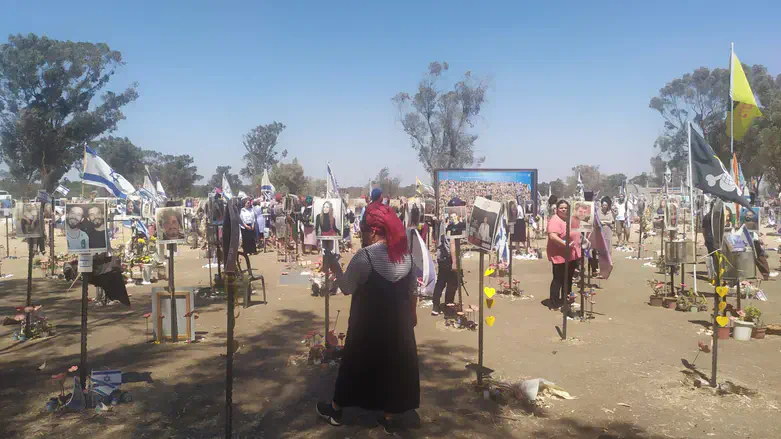
Eyal Azoulai, the police officer who was the acting commander of the Negev District on the morning of October 7, told the Civilian Board of Inquiry for October 7th about the events preceding the Hamas invasion.
He claimed that there had been a warning, but not on the scale of the eventual attack. "The IDF and ISA warned us of a scenario involving a few dozens of terrorists from several infiltration routes into the territory of the State of Israel. We now know that 4,000 terrorists and 2,000 looters were part of the first wave, with another 2,000 behind them."
"I can say with absolute certainty that it was not part of the original plan of the attack on 7.10. The horrors that occurred as 300 terrorists attacked the festival took up several hours and held off the invasion from the rest of the state. I say this to families of the victims as well - their sacrifice saved many others. Hamas had not planned for the festival."
"On October 4, I spoke with a very senior officer in the Southern Command and asked him whether there was anything security-related that could affect the festival, and he told me no. The army gave permission for the festival to take place on October 5 and 6, and eventually extended the permit to October 7. They never explained the reason for the change."
He recounted the first moments of the massacre. "At 06:32-06:30 I called an ISA representative who said that they were receiving all kinds of indications, there might be something in Kerem Shalom and Zikim Beach, but we still did not understand it completely. I called the district commander, Commissioner Amir Cohen at 06:39-06:38 and asked him for the authorization to disperse the party. And he says to me, 'Get rid of them immediately'."
"Two or three minutes later I get a call from the district commander, who said to me the code 'Philistine Rider,' and I realized something bigger was happening. We drove on dirt roads to avoid the highways. If I had come using the ordinary routes, I probably would not have appeared before the Board, since two military forces were killed at the first junction on the road I would have used."
"On that day there were a total of about 1,400 policemen, of whom about 1,000 were specially called as reinforcements, and another 3,000 from our precinct, a total of about 4,000. In the festival compound, we had approximately 420 police officers assigned exclusively to the compound and the perimeter. We did not have a standing force in the surrounding towns, but as soon as we understood they needed help we rushed to defend them, and some died there."
Azoulai commented on how the military forces had taken so long to arrive: "The army as an army began to arrive only in the afternoon. To be sure, the fighters, the helicopters, smaller forces - all those were present, but the battalions of soldiers moving together only began to arrive at 3:00 p.m. The fighting had all ended by 11:00 a.m. at the latest. It was during those few hours that most of the massacre happened, and during those few hours the Israel Police saved the state. That is not simply a cliche phrase - the police stopped the attack with their bodies. Not one officer fled. Our entire precinct joined the fray and held off the attack. My officers and I almost paid with our lives."
He discussed how the Israel Police have been investigating the incident: "They conducted investigations that were presented to the previous commissioner, Kobi Shabtai. Likewise, the district commander turned to two retired generals who are not connected to the south and the fighting but who have extensive experience, presented them with the materials, and asked them to examine the failures. The police are not without their mistakes and pay a heavy price in public criticism. The two who combed through the matter say that the Israel Police, in this case, acted without blemish, with bravery and courage. We are used to the police receiving criticism, often justly. Here one must come, and I say this to the public, and salute the police, and embrace the families."
"The police paid with their bodies. 58 policemen, 22 of them my own policemen that I command. I have criticism that relates to the police, not in the context of the performance of the policemen and commanders, at all levels, from the station level, the district, the region and the national headquarters, who did everything to salvage the situation. It bothers me that the state's security conceptions does not account for the Israel Police. If a situation assessment had to be made at 23:00 and 4:00 in the morning and there is some concern, why not bring up a representative from the police? Bring up the commissioner or the head of the operational division."
He concluded by relating how the security forces in the area had practiced for a large-scale incursion shortly before the massacre actually happened: "On the 24th of September 2023, the Southern District, together with the IDF, conducted an exercise to rehearse the response for a multi-front invasion. One can say that it is almost precisely what happened on 7.10 on a smaller scale - not dozens of terrorists but thousands. Whoever set our reference points for what to expect clearly did not gather intelligence from within the Gaza Strip itself."
